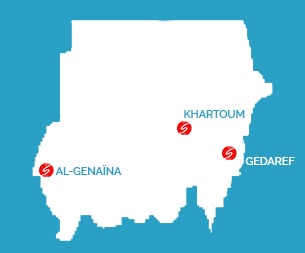Whether they are in the heart of the conflict which is tearing their country apart or whether they fled to the neighbouring Chad, the Sudanese have been subjected to the confrontations between the Sudanese Armed Forces (SAF) and the Rapid Support forces (RSF) for six months. Faced with this situation, the teams of SOLIDARITÉS INTERNATIONAL have been acting on these two theatres of operations since then, that is on that of the phenomenal place of Adré in Chad where displaced persons have found refuge and which accommodated more than 200 000 people in an overcrowded urban space with limited resources on the one hand. And on that of Al Geneina, the central town of the conflict on the other side of the boarder, where the families who stayed in Darfour are surviving facing destitution and violence on the other hand.
Here is below a report by SOLIDARITÉS INTERNATIONAL, from the rear of a truck, about a usual day of violence in this ‘Generals’War’.
‘To start with, it was total chaos. My mum ran away and could not even take my brothers and me with her. It was only after there was a break that she could pick us up. Reaching Adré was not easy. […] We could not even take our things or any food with us, everything has been destroyed,’ Fathia Al Nour, a 16-year-old young woman reports. Such terrifying evidence is far from being the only piece that can be heard in the place where the displaced persons live.
For several months Adré, a small town of 40 000 inhabitants, has seen more than 200 000 people fleeing from the neighbouring Sudan and its war arrive on its land. Tents made with bits and pieces are crammed between the natives’ clay houses. Those new arrivals represent a real influx of people in the middle of the town.
Sudan
Context and action- 43 million inhabitants
- 172nd out of 191 countries on the Human Development Index
- 21.000 people helped
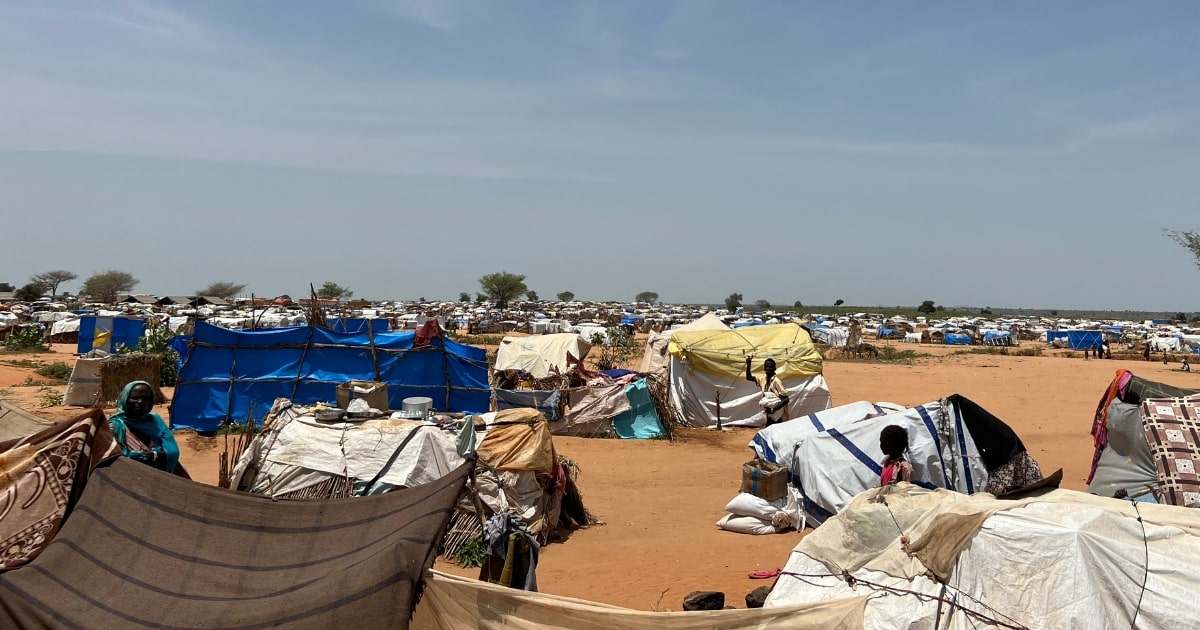
Since the beginning of the conflict, a huge jury camp where displaced persons are crammed has developed in Adré. These men, women and children are trying to survive there when they want for everything.
Photo credit: © SOLIDARITÉS INTERNATIONAL
The humanitarian NGO on the spot find it hard to respond to the population’s massive needs. ‘Hundreds of people are coming to an area whose resources are already limited and whose inhabitants already faced difficulties getting food and water before. Nowadays, 400 000 more people are coming to feed and drink on the same resources as those existing in the East of Chad’ Nelly José, Chad-Cameroon Country Director for SOLIDARITÉS INTERNATIONAL explains.
‘The first people who arrived in Chad had their belongings with them. We saw caravans transporting bundles of firewood, one chair, one small table, etc, but the more time passes, the more the crisis is going on and the less moving to Chad has become a preventive measure: it is a consequence of the fights. As a result people arriving in Chad are more and more destitute. However that may be, even if you move away with a piece of your house, you don’t move away with your whole house!’ Nelly goes on.
Water for the refugees every day
A little farther in the camp our attention is caught by a crowd. Some twenty women and children are queuing up with empty cans on their heads or on the ground. They are waiting patiently to reach a water point managed by SOLIDARITÉS INTERNATIONAL. ‘When I arrived here last June there was just a small well. Today my job consists in supervising the water point, organizing the distribution of water and serving the population,’ says Cherif Harbab who is responsible for the water point. The current boring works thanks to a fuel oil generator but soon the teams of SOLIDARITÉS INTERNATIONAL will put in a solar pump that will allow the boring to work without electricity. ‘Fuel oil will not be needed any more. The sun will do the job instead!’ Maazou Alhassane, who is in charge of the project for the east of Chad jokingly asserts.
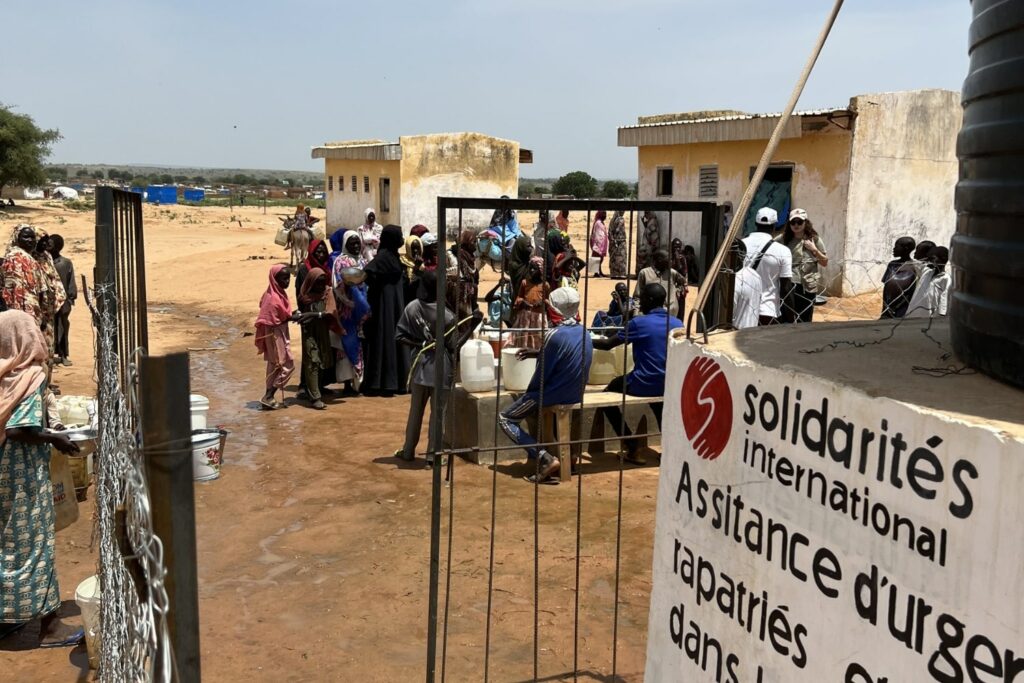
Thanks to a boring in the ground, four black tanks can contain the water drawn from the well. Then the water springs from the taps some metres farther. The women and the children are patiently waiting to get to the precious resource.
Photo credit: © SOLIDARITÉS INTERNATIONAL
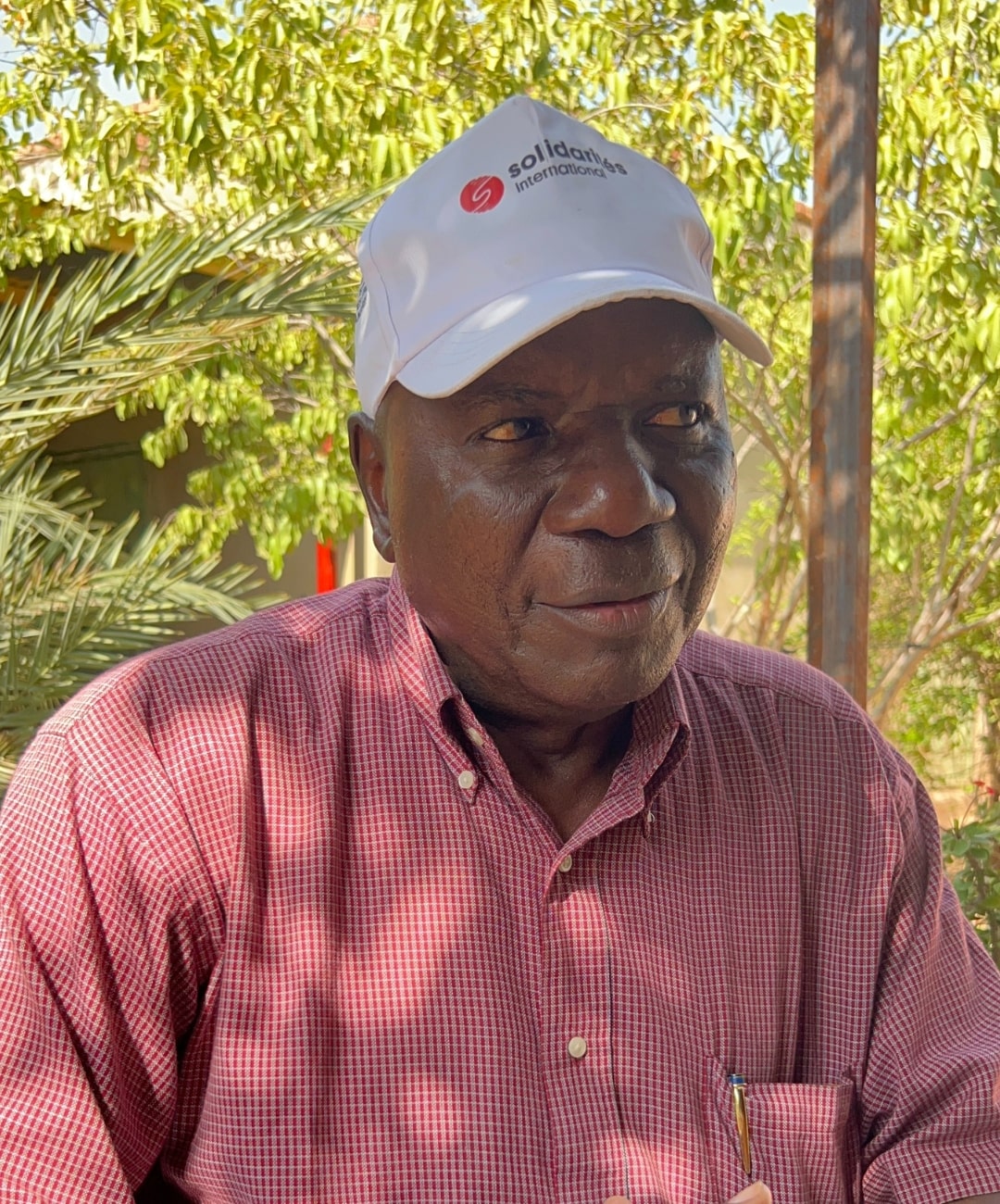
A second water point allows the population to get supplies of water. There, a pump has to be manually activated. Children’s laughs can be heard when they get together to lift and pull down the lever. ‘This pump was not appropriate, so it was very hard for people to pump water. We have changed the model in order to make access to water easier’ Maazou explains.
Maazou Alhassane is in charge of the Chad programme for SOLIDARITÉS INTERNATIONAL.
Photo credit: © SOLIDARITÉS INTERNATIONAL
Some minutes’ drive from there in a big warehouse, other teams of the NGO are busy storing soaps, hygienic pads, toothpaste tubes or even mosquito nets into buckets loaded one by one in a truck due to leave the following day and to drive to Al Geneina, the town situated 35 kilometres away, in the region of Darfour.
As night is slowly falling and the sky is getting orangey, the loading of the truck is coming to an end until the truck is completely full of kits. The teams are going to have a rest in order to be ready for the following day’s distribution.
Every day hygienic kits are brought to the vulnerable Sudanese families by full trucks.
Photo credit: © SOLIDARITÉS INTERNATIONAL
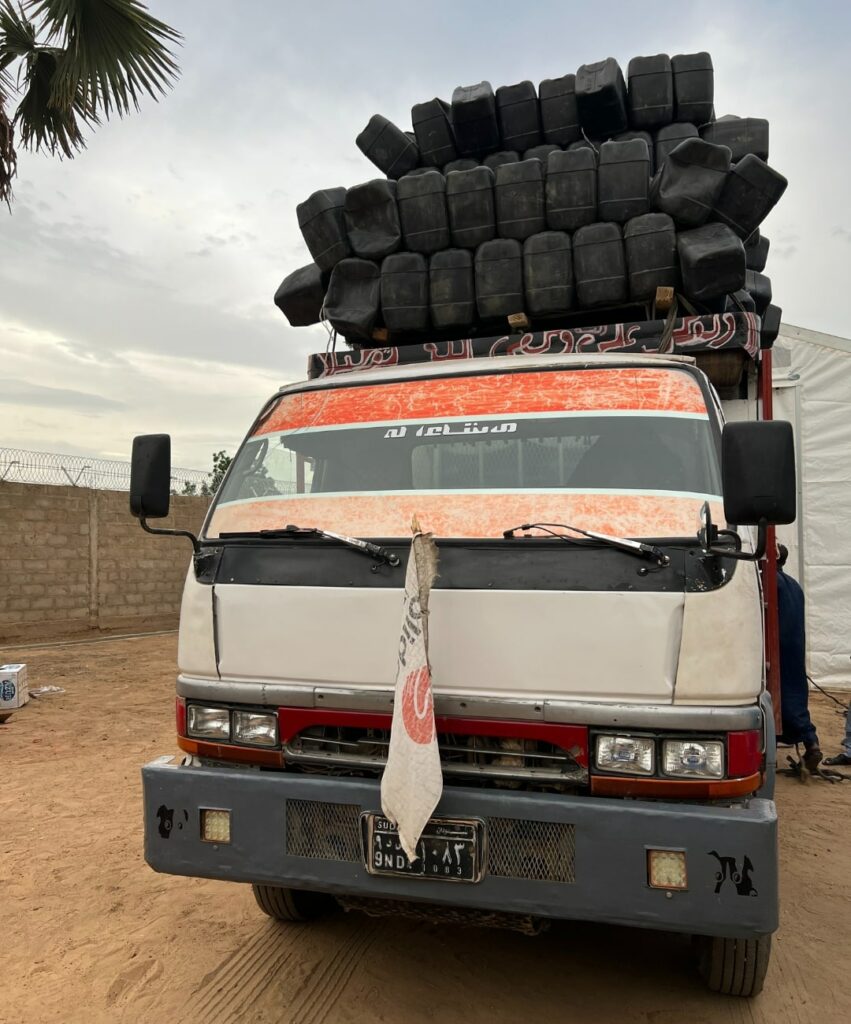
Known as ‘The Generals’War’, the war between General Abdel Fattah Al-Burhane, de facto leader of Sudan, and General Daglo known as ‘Hemeti’, leader of the the paramilitary forces, has been devastating the country since last April 15th. Destruction, plundering, violence and bombing have been the daily life of the Sudanese people for more than 6 months. Present in the country before the war started, SOLIDARITÉS INTERNATIONAL was the first international NGO who managed to get back to Darfour again. In each village, our teams met the inhabitants to estimate their needs and bring them the necessary help. Doing so they can cross the boarder daily to fulfil distributions.
Essential distributions
The departure for Sudan is taking place in the early hours. The road between Adré and Al Geneina is magnificent. Lined with fields and green pastures as far as the eye can see, lived in by great birds and huge herds, this road could almost let us forget the hundred of thousand of people who took it in the opposite direction while fleeing the war in Sudan. Among so much beauty it is hard to imagine those families riding donkeys or horses, in carts, on foot and even sometimes running to get away from acts of violence and death. Yet, numerous checkpoints along the road remind us that Darfour is still an unsafe area where danger is constant.
Entering Al Geneina harsly brings us back to reality. Destroyed iron sheets, burnt cars, buildings spoiled by bullet holes: the town is just a mere shadow of what it used to be before the beginning of the conflict. In a closed battle-scarred school, a hundred or so women sitting on the ground are waiting in the shade for the distribution to start.
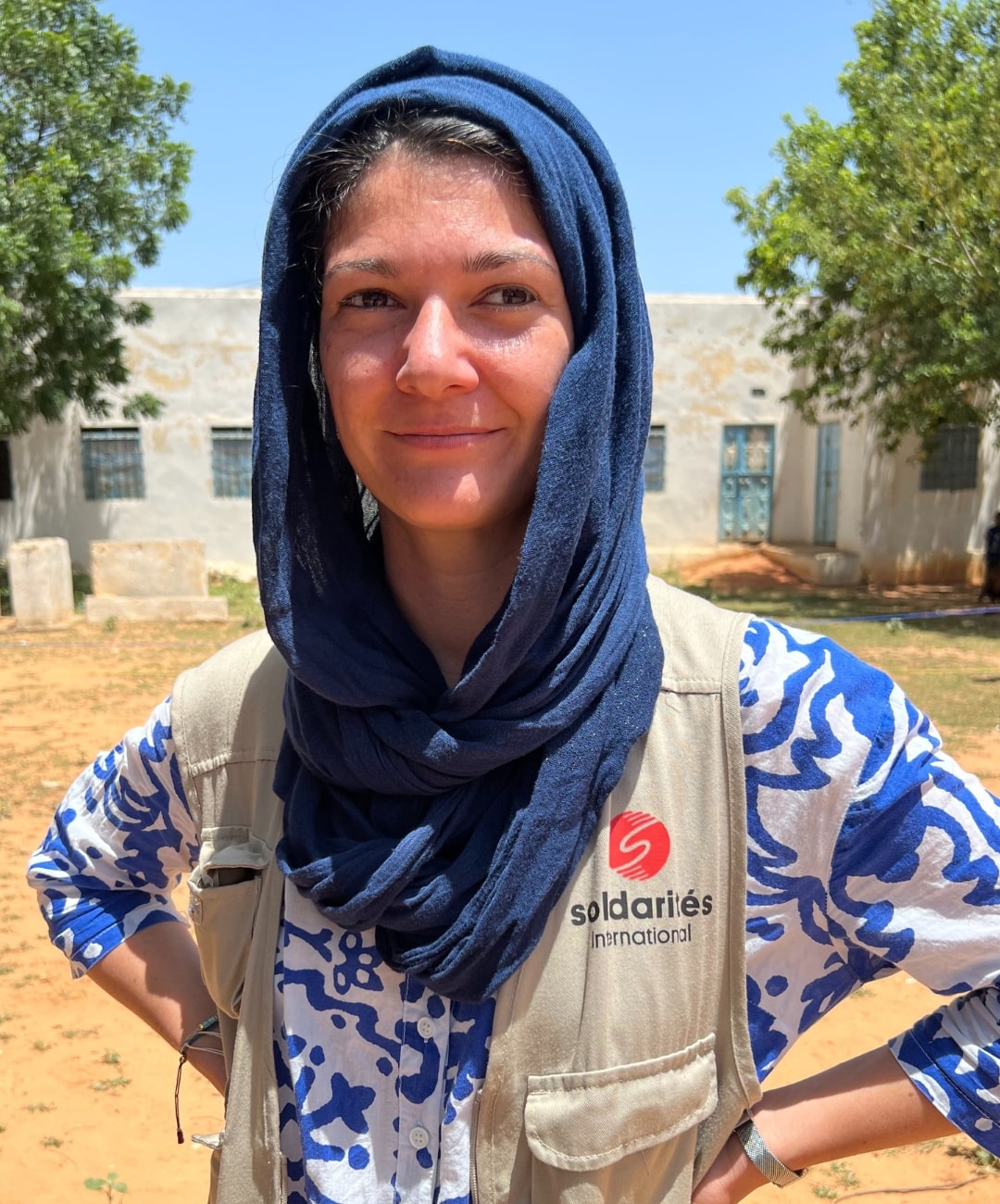
‘These kits are distributed because the market has been very much impacted by the conflict. As a result, the stalls do not always have lots of hygiene products to offer and in addition to that people have little money. Anyway, families do not give priority to buying hygiene products ; they rather give priority to buying food,’ Clémence Lagouardat-Massiroles, Deputy Country Director for SOLIDARITÉS INTERNATIONAL explains.
The lists of distributions are prepared beforehand by the teams in collaboration with the local community leaders so as to select the most fragile and precarious families. Called one after another the women sign the register, then they are given their kits before joining their families again.
Clémence Lagouardat-Massiroles is Deputy Country Director for SOLIDARITÉS INTERNATIONAL.
Credit photo : © SOLIDARITÉS INTERNATIONAL
‘The situation is very difficult because before the conflict I used to work at the Health University and since the conflict began, we have not been given our salaries. […] Now my husband has a daily worker’s job at the market for derisory wages. He sometimes manages to bring us back things but he sometimes cannot’ says Zaina Al Tiani Hasablah, holding her hygiene kits in her hands.
After a four hours’distribution, almost all the kits have gone ; those left will be given to the absentees. The teams are packing their equipment again.
‘What strikes me is the populations’ resilience […] Though they are vulnerable they have found the means to take up a life that cannot be called a normal life but a daily life at least. […] Our job consists in giving them the keys that will help them to overcome those crises and to be able to face the next ones because obviously the situation in Darfour is not going to be settled overnight,’ Clementine concludes.
The afternoon is wearing to its end as the teams are driving back to Chad. They hope that law and order will improve in the coming weeks so that they will not have to take this road any more every day.
A new distribution will take place all day long in another area the following day as well as the day after. Today humanitarian aid is all the more necessary as the conflict is dragging on, causing more and more victims and forcing more and more people to flee from their country…

